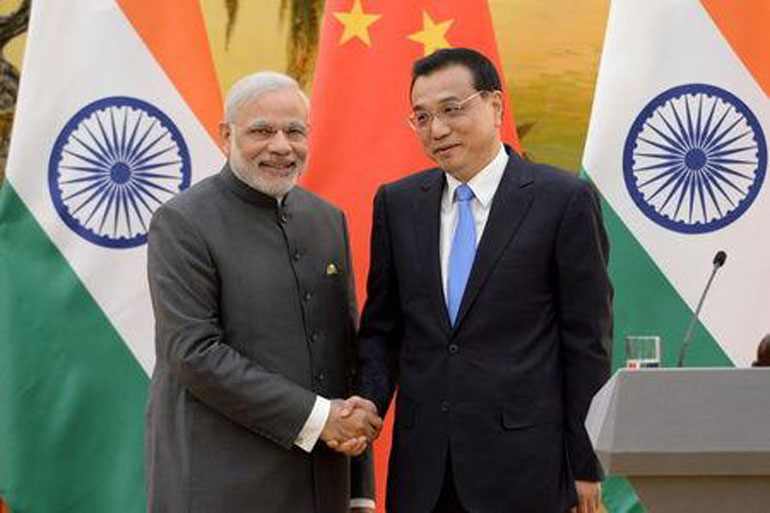Wednesday Feb 25, 2026
Wednesday Feb 25, 2026
Thursday, 28 May 2015 00:14 - - {{hitsCtrl.values.hits}}

Indian Prime Minister Narendra Modi (L) shakes hands with Chinese Premier Li - Reuters
China has wrapped up at least $80 billion of deals, including agreements signed with jet makers, solar cell manufacturers and film studios, during recent visits by its leaders to Russia and Latin America plus a visit by Indian Prime Minister Narendra Modi to China.
Agreements also covered currency arrangements, infrastructure and cooperation in fields such as health and information security.
India: China and India signed 26 business deals worth more than $22 billion in areas ranging from ports to renewable energy to financing.
Bharti Airtel secured financing commitments of $2 billion from the China Development Bank and a $500 million credit line from the Industrial and Commercial Bank of China, while the Adani Power Group signed a framework agreement with China’s Golden Concord Group to explore investments in the natural gas industry.
Other deals included one signed between Indian film studio Eros Group and the China Film Group to co-produce a film called “Xuan Zang”, about a Chinese Buddhist monk who made a pilgrimage to India in the seventh century.
Brazil: Li and Brazilian President Dilma Rousseff signed a series of deals including a $1.1 billion sale of passenger jets made by Embraer to China’s Tianjin Airlines and $10 billion in finance agreements between Petrobras and Chinese banks.
Iron ore miner Vale SA signed deals with Chinese shipping lines China Merchants Energy Shipping Co Ltd and China COSCO Holdings Co Ltd, while the governments discussed the long-running plan to build a railroad over the Andes to the Pacific.
Li put the value of the agreements at $27 billion, while Rousseff said they totalled $53 billion, a ballpark figure that aides said included past and future funding.
Russia: Russia and China signed 32 agreements including a $25 billion deal to boost Chinese lending to Russian firms, rail contracts and an agreement to cooperate on international information security.
VTB Bank, Sberbank and Russian telecoms firm Mobile TeleSystems OAO were among companies that secured credit lines from Chinese banks, while Russian Grids and the State Grid Corporation of China established a joint venture.
Beijing also agreed to provide 300 billion roubles ($5.96 billion) in financing to build a high-speed rail link in Russia while units of China Railway Group and China Railway Construction Corp won building contracts.
Chile: Chile’s central bank and the People’s Bank of China signed a currency swap agreement to facilitate the exchange of up to 2.2 trillion pesos ($3.60 billion) for three years, with China Construction Bank appointed as the yuan clearing bank in Chile.
Peru: China and Peru agreed to study the feasibility of a controversial 5,300-km (3,310-mile) transcontinental railroad connecting Peru’s Pacific Coast with Brazil’s Atlantic Coast.
Chinese Premier Li Keqiang and Peruvian President Ollanta Humala signed cooperation agreements on industrial capacity, energy, mining, infrastructure, quarantine, healthcare and aerospace, and discussed working together on financial issues.
Colombia: Colombia and China agreed to increase cooperation in areas such as production capacity and infrastructure construction, with Li saying that China was ready to set up plants in Colombia to produce iron and steel, the Xinhua news agency reported.
Colombian President Juan Manuel Santos and Li also signed agreements for a development plan for the port of Buenaventura and a scholarship program.
Belarus: China signed a five-year memorandum on Belarussian potash supplies and a seven billion yuan ($1.13 billion) currency swap agreement. It also extended $3 billion in credit to Belarussian companies and $4 billion in commercial credit to Belarussian banks.